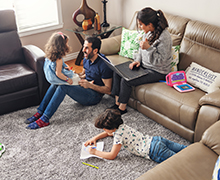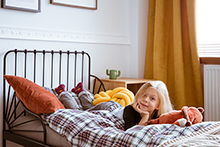Fall 2020
Parenting Tips for Trying Times
 Parenting is a source of joy that also requires a whole lot of work. That’s truer than ever now, as the COVID-19 pandemic wears on. Parents are taking on extra responsibilities, including more hands-on involvement with their kids’ schooling.
Parenting is a source of joy that also requires a whole lot of work. That’s truer than ever now, as the COVID-19 pandemic wears on. Parents are taking on extra responsibilities, including more hands-on involvement with their kids’ schooling.
During these stressful times, our own emotions may sometimes feel oversized. It’s no wonder we’re seeing changes in our kids’ emotions and behaviors. Parents and kids alike need to breathe deeply, practice self-care, hold on to our humor and optimism, and take things one day (and sometimes one moment!) at a time. As we strive to create peace and stability for our families, here are some guideposts to keep in mind.
Be a role model. Our kids watch us closely, and our actions speak volumes. Let them see you making smart, healthy choices relating to diet, exercise, screen time, hygiene and sleep. Be kind and respectful with your words and actions.
Offer compassion and comfort. Encourage your child to share all their feelings. In return, be an active, empathetic listener. Respond to their fears with consistent, reassuring messages. Give them lots of opportunities to be physically near you. If your child loves cuddling, offer plenty of it. Stay faithful to comforting routines that help you connect, like shared family meals and soothing bedtime rituals.
Be generous with praise and positive attention. Recommit to a positive, nurturing approach to parenting — including positive discipline techniques like setting clear expectations and rewarding desired behaviors.
Carve out time for play every day. Whether it’s a family game night, a quick round of knock-knock jokes or an outdoor scavenger hunt, make time to play and laugh together. The simplest things have the power to delight — like building a cozy blanket fort or designing a fun hopscotch course with chalk.
Take a break when you feel overwhelmed. Treat yourself to a timeout when you need one. Take a quick walk, soak in a hot bath, sip a cup of tea or call a trusted friend for a heart-to-heart talk.
Consider that someday (hopefully soon!) the pandemic will be over. Yet for the rest of their lives, our kids will reflect back on this experience and know that they can always count on their families.
Learn more about positive parenting.
Seasonal Flu Vaccines Are Extra Important this Year
 Preventing the flu during the 2020-2021 influenza season will be more important than ever. In the midst of the COVID-19 pandemic, we all need to stay as healthy as possible and not overload our healthcare system. The flu vaccine reduces hospitalizations and deaths.
Preventing the flu during the 2020-2021 influenza season will be more important than ever. In the midst of the COVID-19 pandemic, we all need to stay as healthy as possible and not overload our healthcare system. The flu vaccine reduces hospitalizations and deaths.
Everyone 6 months and older should be vaccinated. Healthy children over 2 may get either a flu shot or a nasal-spray vaccine. Aim for you and your family to get the flu vaccine by the end of October.
If you have questions or doubts about vaccines, ask your child’s doctor. It’s always best to get health information from a medical professional.
Visit About the Flu to learn more.
Encouraging Healthy Gender Development
 On the day babies are born, they are assigned a sex. This concept refers to doctors observing physical characteristics and choosing male or female for the birth certificate. However, gender identity is much more complex. It describes how you express yourself and the way you feel on the inside. Upholding a child’s assigned sex without giving them space to explore their gender identity and express themselves can cause problems. Instead, parents and caregivers can intentionally encourage gender exploration, so that their children feel loved and supported and develop good self-esteem. Here are some ways that you can encourage healthy gender development:
On the day babies are born, they are assigned a sex. This concept refers to doctors observing physical characteristics and choosing male or female for the birth certificate. However, gender identity is much more complex. It describes how you express yourself and the way you feel on the inside. Upholding a child’s assigned sex without giving them space to explore their gender identity and express themselves can cause problems. Instead, parents and caregivers can intentionally encourage gender exploration, so that their children feel loved and supported and develop good self-esteem. Here are some ways that you can encourage healthy gender development:
Allow children to choose things, like clothing, toys and activities, for themselves. Giving them space to choose what they like supports healthy gender identity.
Be conscious of how you talk about gender. Avoid reinforcing gender stereotypes. Use gender-neutral language as much as possible.
Read and talk about gender with your child. There are many children’s books that explore diverse gender identities.
Learn more about gender identity development.
Drop, Cover and Hold On!
 Earthquakes have been rumbling all over in 2020. The Pacific Northwest is an earthquake-prone area, and experts warn that we are overdue for a big one. It’s essential to have a disaster supply kit ready and that you and your child know what to do when the earth starts to shake.
Earthquakes have been rumbling all over in 2020. The Pacific Northwest is an earthquake-prone area, and experts warn that we are overdue for a big one. It’s essential to have a disaster supply kit ready and that you and your child know what to do when the earth starts to shake.
In most situations, the chances of injury are reduced if you DROP onto your hands and knees, COVER your head and neck with one arm and hand, and HOLD ON until the shaking stops. Being on hands and knees protects you from being knocked over and allows you to crawl to nearby shelter — like a sturdy table or desk — if it’s available. If you are under shelter, hold on to it with one hand and be ready to move with it if it shifts. If no shelter is available, crawl away from outside windows and hold on to your head and neck with both arms and hands.
If you are in bed, stay there and lie face down. Cover your head and neck with a pillow and keep your arms as close to your head as possible. Hold on to your head and neck with both hands until the shaking stops.
If you are outdoors, move to a clear area if you can safely do so — avoiding power lines, trees, signs, buildings and vehicles — then drop, cover and hold on.
If you are driving, pull over to the side of the road, stop and set the parking brake. Stay inside the vehicle until the shaking stops.
Learn about specific actions to take in other locations and how to prepare a disaster supply kit.
Get Moving!
 When the pandemic closed schools and forced us to stay at home, many families understandably lost their focus on exercise. If your family needs to get back to healthy habits, take some simple steps to get your bodies moving again.
When the pandemic closed schools and forced us to stay at home, many families understandably lost their focus on exercise. If your family needs to get back to healthy habits, take some simple steps to get your bodies moving again.
It might start with taking a walk before the school day starts or as soon as it ends. Or try a new exercise routine — like yoga with online instruction or targeted workouts guided by a smartphone app. Older kids may enjoy a regular walking or running routine that gives them some time to themselves each day.
And be sure to get outside as a family! You can shoot hoops in the driveway, enjoy a family bike ride or take the dog for a romp in the park.
Learn more about exercise and children.
Weighted Blankets Not Safe for Infants and Young Children
 Weighted blankets have recently become widely available, claiming to provide a sounder sleep. As tempting as that promise sounds, weighted blankets should never be used with young children and certainly never with infants.
Weighted blankets have recently become widely available, claiming to provide a sounder sleep. As tempting as that promise sounds, weighted blankets should never be used with young children and certainly never with infants.
For infants, a safe sleep environment is the three B’s: boring, bare and basic. To reduce the risk of Sudden Infant Death Syndrome (SIDS), infants must always be placed on their backs to sleep. Crib mattresses should be firm and fit tightly in the crib. Other than a snug fitted sheet, the crib should have no blankets, pillows, stuffed animals or other items. If your baby or child is having problems with sleep, talk with your doctor.
Choosing Hand Sanitizer
 COVID-19 has brought handwashing to the forefront of our minds. While washing hands with soap and water is the most effective way to reduce the spread of germs, they are not always readily available. Hand sanitizer is the next best option.
COVID-19 has brought handwashing to the forefront of our minds. While washing hands with soap and water is the most effective way to reduce the spread of germs, they are not always readily available. Hand sanitizer is the next best option.
Keep the following tips in mind when selecting a hand sanitizer to ensure that you are choosing a product that is safe and effective.
- Choose a hand sanitizer with 60 to 95% alcohol content.
- Avoid hand sanitizers that contain methanol.
- Be aware of hand sanitizers that make false or misleading claims. Avoid products that claim to protect against germs for extended periods of time.
Learn more about proper handwashing or hand sanitizer.
Quick Tip
In Washington state, it is the law for children to ride in a booster seat until they are 4 feet, 9 inches tall (57 inches). Most kids will need a booster seat until they are 10 to 12.